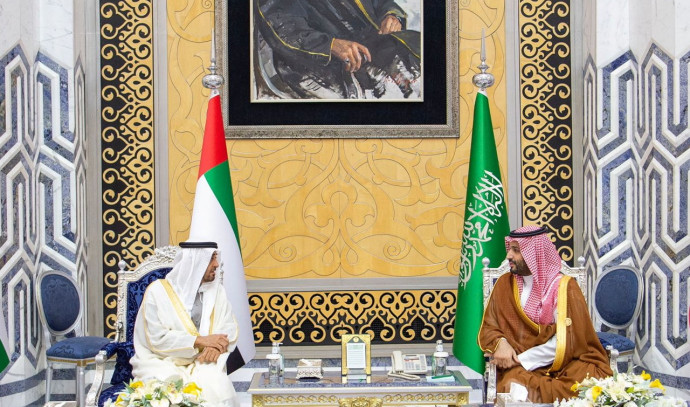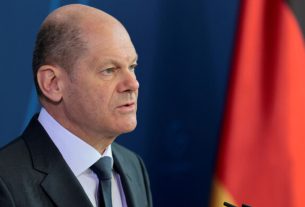|
Getting your Trinity Audio player ready...
|
Intense competition between Gulf Cooperation Council members and geographical neighbors Saudi Arabia and the United Arab Emirates to attract foreign investments and foreign billionaires has reached the point where they have begun enacting laws that contravene their common GCC orientation.
In 2022, Saudi Arabia, the largest of the GCC countries, attracted foreign investments worth $8 billion. The UAE did not announce results for 2022 but said that it attracted investments worth $20 billion in 2021. Cumulative foreign investments in Saudi Arabia amount to $1 trillion and in the UAE to $171 billion.
Seeking to consolidate its position as a leading logistics center in the region and to attract more foreign investment while diversifying the country’s economy away from oil, Saudi Arabia revealed its first integrated economic zone, which will be tax-exempt for companies for up to 50 years. This means the emergence of a fierce competitor to the Dubai port of Jebel Ali.
A source told The Media Line that at least 500 companies have so far moved their regional headquarters from Dubai in the UAE and Manama in Bahrain to Riyadh and Jeddah in Saudi Arabia, in order to be able to conduct direct government contracts. The source added that “the volume of companies that have moved to Saudi Arabia exceeds $6 billion.”
The UAE is home to most of the regional multinational companies, and it is set to introduce a 9% corporate tax next year in lieu of the current free presence. That rate is still lower than Saudi Arabia’s corporate tax rate of 20%.
In a press statement, Saudi Investment Minister Khalid Al-Falih revealed that new temptations being offered by Saudi Arabia include “tax exemptions.”
Al-Falih’s statement came after companies raised fears about the fear of double taxation if they moved their offices to more than one country, especially in the absence of an agreement to prevent double taxation between Saudi Arabia and other Gulf countries.
Saudi market largest among Gulf countries
Companies that move to Riyadh are seeking to obtain a share of the Saudi market, the largest among the Gulf countries. According to 2022 figures, the Saudi population constituted more than 55% of the Gulf population of 57 million and Saudi gross domestic product amounted to about $770 billion. Meanwhile, according to 2021 figures, the population of the UAE was about 9.5 million and its GDP was about $415 billion.
The Saudi-Emirati competition also increased after Riyadh issued a decision regarding the exclusion of goods manufactured in free zones or produced by Israeli companies from the customs tariff privileges granted to imports from the Gulf states.
Despite all the privileges offered by Saudi Arabia, the UAE still enjoys the interest of businesspeople and is the headquarters of more international companies. As well as favorable economic laws, the UAE has been preferred for its openness and its easy provision of visas to businesspeople, as well as its entertainment areas, which allow alcoholic beverages, parties, and other advantages that Riyadh does not yet offer.
Saudi Arabia is also seeking to attract several hundred Russian billionaires who have made Dubai their business headquarters during the current Russian-Ukrainian war. A number of press reports have been published detailing the presence of hundreds of Russian businessmen who transferred their money, properties, and companies to Dubai after international sanctions against them began.
Meanwhile, the UAE presented the “Projects of the 50” initiative, which seeks to attract $150 billion over the next nine years and aims to expand its exports to 10 global markets.
“The competition between Saudi Arabia and the UAE is a natural and logical thing. The competition is fair, and every country seeks to attract more investments to it,” Abd al-Rahman al-Jubairi, a writer and economic analyst, told The Media Line.
“This competition does not stem from disagreement, but rather from agreement and brotherhood. When the Saudi economy strengthens, the UAE economy will also strengthen, and vice versa, and we have a very clear European model, as there are companies that have headquarters in all European countries, and operate smoothly, and all European Union countries benefit.”
Speaking of companies moving to Saudi Arabia, Al-Jubeiri said, “The foreign investor seeks to achieve his personal interest in the first place and the goals of the economy of his country from which he came.”
Saudi Arabia represents 50% of the Gulf economy, and 25% of the Arab countries’ combined economy, and this is something that “cannot be underestimated, especially with the boom in projects during the current period and the economic transformations taking place in Saudi Arabia,” he said.
Amr Mostafa, a business consultant residing in the UAE, told The Media Line, “The relocation of several regional companies to Saudi Arabia will not harm the UAE economy much. There are thousands of companies in the Emirates that will not dispense with their presence in Dubai, the financial and business center in the Middle East. It is true that they will open regional headquarters in Riyadh, in order to keep up with Saudi laws, but it will be expansion, not a transfer.”
He continued, “Saudi Arabia [is] with new laws, and now it has moved toward openness and investment, and certainly, it is a new experience, and there will be more openness in the future, and certainly, there will be an agreement between these countries on several points.”
However, the CEO of a financial investment company, who preferred not to reveal his name or that of his company, told The Media Line, “We were forced to move to Saudi Arabia. We used to work in one of the [other] Gulf countries, but most of our customers are from Saudi Arabia. The Saudi authorities began to restrict our business, by preventing citizens from dealing with us, and transfers to and from the company were also stopped, which forced us to open a regional headquarters in Riyadh.”



